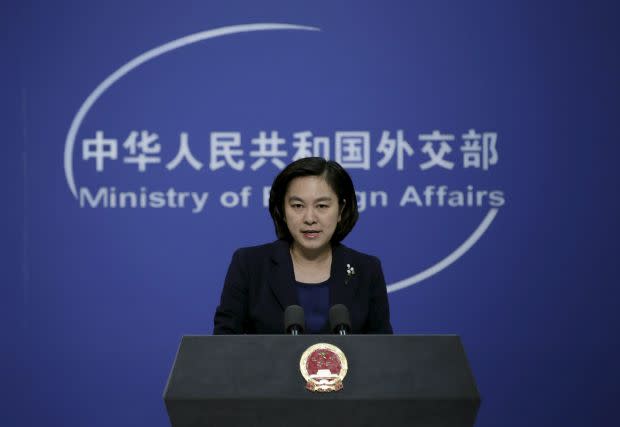The story of Aunt Xianglin, the pitiable female character China compared to Mike Pompeo

As relations between the US and China continue to worsen, so too have the insults lobbed by Chinese officials against their American counterparts.
At a press conference yesterday (Dec. 3), Hua Chunying, the spokeswoman for China’s foreign ministry, said that US secretary of state Mike Pompeo was “behaving just like” Aunt Xianglin (祥林嫂), telling the same story about China “time and again.” The reference may be lost on Pompeo and other US officials, but its meaning was immediately clear to many in China—Pompeo is just a petty nag.
Aunt Xianglin is a character from “New Year’s Sacrifice” (祝福), a short story written in 1924 by Lu Xun, arguably the best-known modern Chinese writer. In the story, Aunt Xianglin, who is mentally challenged, is a widow of a young man who died of illness and works as a servant—she is never referred to by her own name in the story, only in relation to her first husband, Xianglin. She is later forced to re-marry by her mother-in-law for the dowry. The second husband also dies of illness, and their new-born son killed and eaten by wolves. Despite these unfortunate incidents, Xianglin presses on with life and returns to work as a servant. However, the family employing her believes she carries bad luck and forbids her from preparing the new year sacrifice, an important Chinese ritual for paying respect to ancestors. The incident breaks Aunt Xianglin, who later ends up begging on the streets, telling the same story repeatedly about her son’s death. She eventually dies quietly on a winter night.
“But unlike her harmless monologue, Mr. Pompeo keeps repeating poisonous lies,” said Hua.
CN Spokeswoman Hua Chunying called Pompeo “Xianglin Auntie” (祥林嫂) today, quoting a character from Lu Xun novel to paint Pompeo, who criticized IP theft, as a mentally illed woman who keeps repeating stories. It’s tone deaf af even by China standards. Literature breakdown: 1/n pic.twitter.com/Hght7FM9yJ
— Toni (but what’s your *real* name?) (@tony_zy) December 3, 2019
Hua made the comments in response to a question raised by an unidentified journalist, who cited a Politico article that quoted Pompeo as saying European countries should not give control of their critical infrastructure to Chinese tech giants because of their close ties to Beijing, according to a transcript published by the foreign ministry. As one of the most hawkish US politicians on China, Pompeo often criticizes China on a range of issues including Hong Kong and Xinjiang, comparing China’s suppression of the Uyghur Muslims to East Germany for example.
By invoking Aunt Xianglin, Hua was resorting to deep-rooted tropes that are offensive to both women and mentally challenged people in order to denigrate Pompeo. “There is already lots of mockery of Aunt Xianglin in daily life. But somehow I feel sad to see her being made fun of like this on a national level,” said one user (link in Chinese) on social network Weibo.
Some said that Hua’s allegory completely deviates from the original meaning of the story. Lu, who is loved in China for his rebellious spirit during a time of great social upheaval in China, was critical of the country’s feudal and imperialist practices at the turn of the last century. His essays are also compulsory reading in Chinese schools. The character of Aung Xianglin, a person ranking near the bottom of China’s social hierarchy because of her gender and lowly birth, was intended by Lu to evoke sympathy, not ridicule.
Others noted that it was simply unbecoming for the Chinese foreign ministry to use such references in the diplomatic sphere. A Weibo post (link in Chinese) that has been shared thousands of times said: “I personally think anyone who has read the story would not use Aunt Xianglin, an unfortunate figure, as a way to insult others… (But) it is one thing to use the character casually in daily conversations, and totally another to use it in a high-level diplomatic occasion like the press conference.”
Sign up for the Quartz Daily Brief, our free daily newsletter with the world’s most important and interesting news.
More stories from Quartz:
